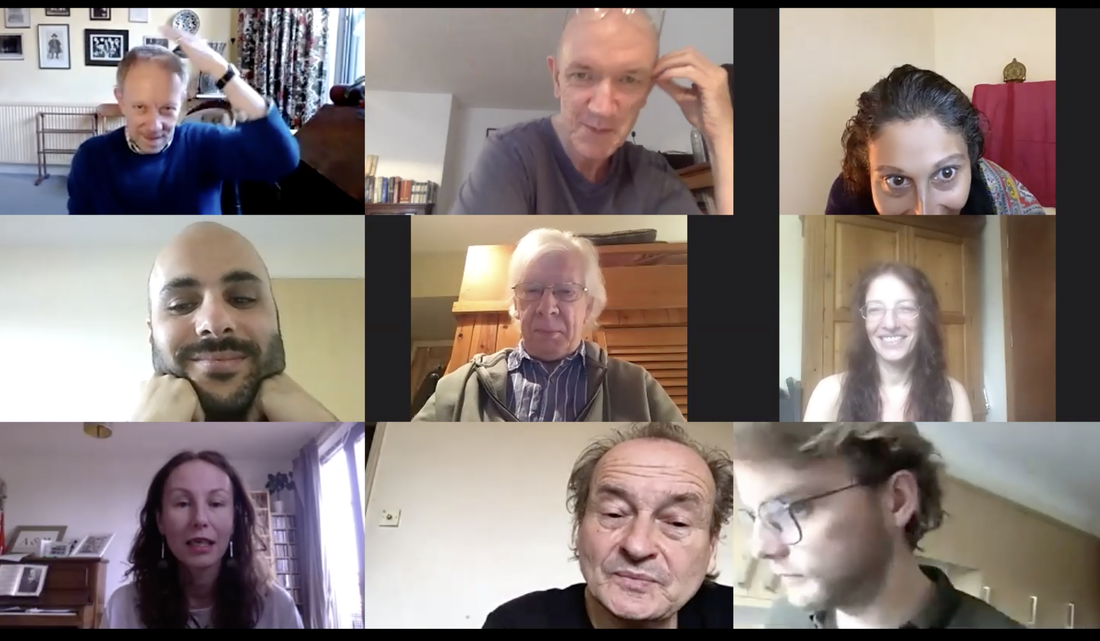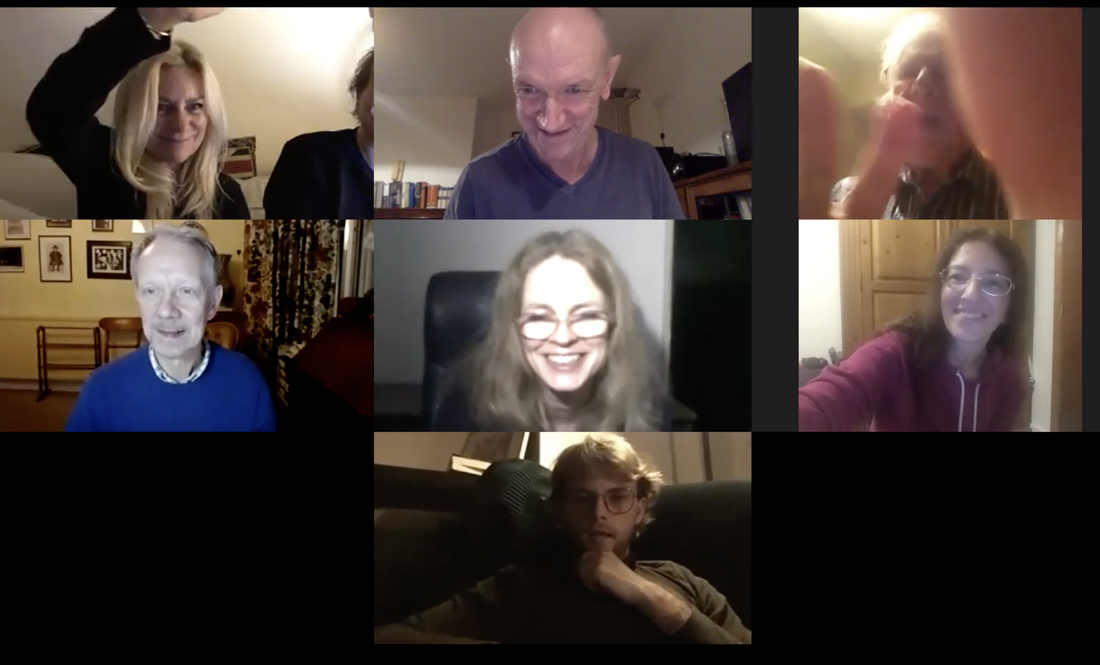|
Fri 13th November
Present: Jamie Newall; Colin Ellwood; Sakuntalla Ramanee; Hemi Yeroham; David Whitworth; Julia Winwood; Emmanuela Lia; Marta Kielkowicz; Simon Usher; Valerie Gogan; Adam Tyler
After the epic experience of last week’s all-action Schiller, here two shorter scripts aim to fathom the boundaries of the unknown. Firstly Maurice Maeterlinck’s hugely influential Symbolist Les Aveugles (The Blind/The Sightless) from 1890, in Laurence Alma Tadema's translation from five years later. Six blind men and six blind women from an ‘asylum’ on an island wait in a forest clearing for the return of their supervising priest, only latterly to discover that his corpse has been with them all along. Read privately, the symbolism here seems crushingly obvious, but when voiced in the live session, the blind characters’ central high-stakes action of listening comes to the fore, as does the delicate balancing of the multiple ensemble roles and voices, and the imaginative and psychological logic with which the situation unfolds from its simple originating premise. The performance itself rises to meet and subsume the play’s idea/concept like a tide coming in, and it is wonderful in this reading to hear all involved easing themselves towards trust in the material; allowing rather than imposing. The text itself enacts a series of attempted ‘fathomings’ of the unknown, and the outline of this activity is – in an almost Brechtian way - thrown into stark relief by the fact that we (the audience) can ‘see’ the situational reality that the characters themselves only dimly apprehend. By motivating his characters to truly wait - at the apparent mercy of large forces held in potential that they are trying to apprehend without provoking - Maeterlinck has found the perfect engine to drive performers' sensitised stillness and economy of gesture. On the other hand what makes the play apparently so at odds with current times is its assumption that the implied death of religious authority and the accompanying metaphorical human ‘blindness/lostness’ needs in itself saying, let alone the sense that this state of affairs is profoundly tragic. What was clearly news in 1890 now surely palls in significance in light of the travails of the subsequent century and beyond. The play takes place in a lush forest, and we are now all too aware that the forest itself is under existential threat. And necessary efforts to preserve that ‘forest’ can in themselves now bestow meaning. The play’s quiescence in the face of meaninglessness then feels both self-indulgent and self-aggrandising. The Blind then marks a moment of sudden absence and withdrawal, the moment when a huge edifice – religious sensibility – has already collapsed, but before the echo of the collapse has died away. Subsequent waves of performance (after-shocks?) replay this moment of seismic crumpling as burlesqued farce (the absurdists) or (as in Beckett) as shrivelled, rigamortised formalisms; as small structures fashioned from the wreckage of the ‘temple’, through which inhabitants can occasionally peek to experience Maeterlinckian moments of universal silence, awe and terror. In that terror and awe though, there is also a beauty, an apprehension of sublimity, born of the stark and straitened earnestess of stillness and listening. And that is what the vividly imagined and rigorously developed dramatic situation of Maeterlinck’s play, if trusted and invested in by performers as here, conjures beautifully. For the second half of the session, an even greater rarity: German Lutheran theologian and pastor Deitrich Bonhoeffer’s 1942 dramatic scenes towards an unfinished play: Three extended, discursive encounters set in a small Germany town in the aftermath of World War One. The student son of the local hospital surgeon and his wife has only a year to live, having sustained serious wounds in the trenches. His parents know this and his closest friends find out through the action. He knows too, but he doesn’t know that they know. He yearns for a kind of noble acquiescence to death; for a silence to counteract the empty rhetoric of ‘freedom’ that is coming to dominate the contemporary political agenda as – implicitly – the Nazis advance. The play’s premise is that the latter have arisen as a result of a kind of ‘un-rootedness’, a lack of trust and of deep societal order. Death, and knowing how to die, is the ultimate test of authenticity, the validation of that underlying order, of the eternal loving cycle of mortal prey culled by divine ‘hunter’. As part of this cycle death is portrayed as a kind of act of love perpetrated by god. It’s a patrician and acquiescent vision, and here balances the preceding Maeterlinck in its advocacy of fatalistic acceptance of the inevitable (whereas Maeterlinck’s characters are terrified of this), but it echoes the earlier play in its recognition of the limitations of language and in its general homing in on death and silence. In the Bonhoeffer, the dying middle-class student is contrasted with a working class war-wounded boy who is by comparison ungrounded, thinking of suicide, and visited by a stranger who may or may not be death, or represent the commercialisation of death. Bonnhoeffer apparently abandoned the drama because he thought the material wasn’t ‘dramatic’, but there is something refreshing about the expansiveness and discursiveness of this, the careful setting out of fresh and thoughtful arguments that in the reading itself was hugely absorbing. And the battle between the ‘grounded’ and ‘ungrounded’ youth surely has great dramatic potential. While Maeterlinck seriously attends to the universe, Bonhoeffer attends to ideas about the universe. Chastened awe, a rare commodity in current drama, is vividly present in both.
0 Comments
Leave a Reply. |
INDEX of dates:
INDEX of playwrights and plays:
INDEX of contributors:
|


 RSS Feed
RSS Feed
